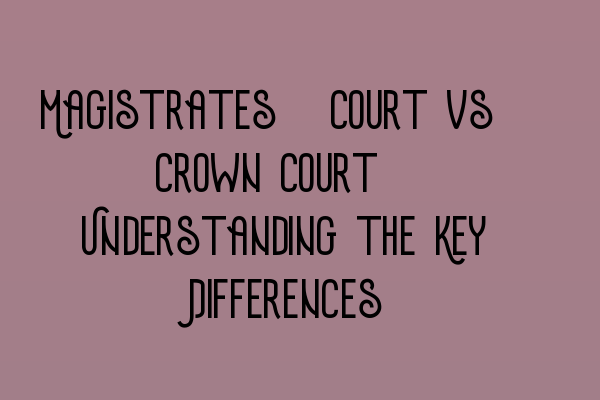Magistrates’ Court vs. Crown Court: Understanding the Key Differences
If you find yourself facing criminal charges in the United Kingdom, it’s important to understand the key differences between Magistrates’ Court and Crown Court. Each court has its own jurisdiction and procedures, and knowing these differences is crucial for a successful legal strategy.
Magistrates’ Court
Magistrates’ Court, also known as the Summary Court, is the first point of contact for most criminal cases. It handles less serious offences such as minor theft, public disorder, and traffic violations. This court consists of a bench of three lay magistrates or a single district judge. Cases in Magistrates’ Court are usually heard without a jury.
The key advantages of Magistrates’ Court include its accessibility, speed, and cost-effectiveness. It is generally quicker to get a hearing in Magistrates’ Court, and legal representation is not always required. However, it is always recommended to seek legal advice to increase your chances of a favorable outcome.
In Magistrates’ Court, the sentencing powers are limited to a maximum of six months imprisonment and/or a fine. For more serious offences, the case may be sent to the Crown Court for trial and sentencing.
Crown Court
Crown Court is a higher court that deals with more serious criminal cases, including murder, rape, and drug trafficking. It has greater sentencing powers and cases are heard by a judge and jury. The jury consists of 12 members of the public who determine the defendant’s guilt or innocence.
The Crown Court offers a more formal and procedural environment compared to Magistrates’ Court. Legal representation is strongly advised, as the complexity of the cases and the potential for longer sentences require an experienced criminal defense solicitor or barrister.
Unlike Magistrates’ Court, Crown Court trials are open to the public, allowing for increased transparency. The potential sentences in Crown Court are more severe, with imprisonment terms ranging from a few months to life, depending on the gravity of the offence.
Key Differences
It’s important to note the following distinguishing factors between Magistrates’ Court and Crown Court:
- Jurisdiction: Magistrates’ Court deals with less serious offences, while Crown Court handles more serious crimes.
- Legal Representation: Legal representation is not always necessary in Magistrates’ Court, but it is highly recommended in Crown Court.
- Sentencing Powers: Magistrates’ Court has limited sentencing powers, while Crown Court can impose more severe sentences.
- Jury Trials: Only Crown Court conducts trials with a judge and jury, while Magistrates’ Court trials are heard by a panel of magistrates or a district judge.
- Accessibility: Magistrates’ Court offers a more accessible and cost-effective option for defendants.
Conclusion
In summary, understanding the differences between Magistrates’ Court and Crown Court is essential for any individual facing criminal charges in the UK. While Magistrates’ Court is suitable for less serious offences, Crown Court is the appropriate jurisdiction for more serious crimes. Seeking legal advice and representation is crucial to protect your rights and ensure the best possible outcome for your case.
To further enhance your understanding of the legal system and prepare for your upcoming SQE exams, we recommend checking out our related articles:
